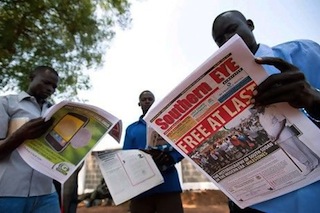South Sudanese media forced into self-regulation by security services
May 27, 2013 (JUBA) – South Sudanese media organisations are no longer covering stories critical of the government, specifically those relating to the security services and corruption, reporters and journalists say.

“They do not want us to publish anything about [rebel leader] David Yauyau. They want nothing about soldiers [from the South Sudanese army] who ran away from [fighting Yauyau] in Jonglei because of hunger and lack of payment. They only want their side of the story in Jonglei to be only the one reported by all the media. This is the situation in which we are operating”, the reporter, who did not wanted to be identified said.
Security operatives are closing monitoring the media’s reporting of political activities critical of president Kiir’s recent decision to removed powers he delegated to his vice president Riek Machar.
“They are also coming and telling us not to cover any political engagement of vice president, especially those related to some of the powers which the president had withdrawn from him”, the Al Masir reporter said.
The security services “have pushed us to exercise self-regulation because most of our reporters fear being arrested because they have families for whom they are responsible and you know it takes time for someone to be released or taken to court. They just keep [journalists] in their cells even when there is no grounds”, he explained.
Another journalist with The Citizen, a daily English newspaper said the that his publication as well as Sudan Tribune were recently excluded from attending the recent Greater Bahr el Ghazal regional conference in Wau.
Sudan Tribune journalist Ngor Garang was initially invited to the conference but decided not to attend after hearing that many politicians and officials attending objected to his presence and wanted to bar him from attending due to the website’s coverage of internal politics within the ruling SPLM.
Garang said Monday that he understood that some people were concerned that he would expose “secretive deliberations” behind the scenes at the conference.
Instead of travelling to Wau Garang says he decided to cover the event from Juba by speaking to participants after each session.
The US Ambassador to Juba, Susan D. Page has expressed deep concerned about media freedom in South Sudan.
This follows the letter written by the Executive Director for Committee to Protect Journalists (CPJ), Joel Simon, to the South Sudanese president and copied to Ambassador Page among other diplomats about the issue of media freedom in the country.
The CPJ letter expressed deep concern about the deteriorating state of press freedom in the country.
“In the past six months, CPJ has documented several cases of attacks, intimidation, and detention of journalists by security agents in South Sudan and we are concerned that this harassment has led to self-censorship and even exile among the local press corps,” the CPJ letter partly reads.
“We urge you [President Kiir] to use the power of your office to ensure that journalists are allowed to work freely without harassment and censure from state security officials.”
CPJ said it has documented at least 12 cases of attacks, harassment, and detention of journalists in South Sudan in the last six months.
In line with the CPJ letter, Page said: “We are very concerned about press freedoms and other freedoms. We believe it is an obligation for the government to uphold what the government says it values.”
Ambassador Page said intimidation of journalists is continuing and that freedoms that are enshrined in the transitional constitution of South Sudan should be followed.
According to the letter, security officials are the perpetrators of the deteriorating journalism environment in South Sudan.
CPJ says the harassment of journalists is a violation of Article 24 of South Sudan’s transitional constitution, which stipulates that “all levels of government shall guarantee the freedom of the press.”
The letter urged the president to ensure that security agents who continue to intimidate and censor the South Sudanese press face the consequences including criminal prosecution.
“Such a firm response to these violations will restore confidence among the local media and ensure that the freedoms for which your government fought will be upheld,” the letter added.
(ST)
